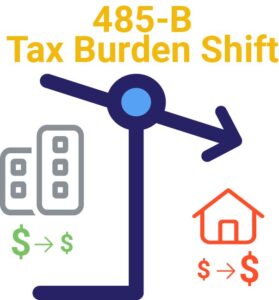FOR IMMEDIATE RELEASE

As Yorktown residents face rising costs across the board, it’s time to examine a policy that affects every taxpayer’s wallet: the 485-b tax exemption law. Enacted in 2017 and never reviewed since, this law provides substantial tax breaks to commercial developments that shift the tax burden onto residential property owners.
Town Board members point to developments like Uncle Giuseppe’s, Lowe’s, and Optum as justification for continuing these permanent tax exemptions. However, this argument overlooks a crucial fact: our neighboring municipalities attract similar commercial investments without offering such generous tax breaks. These businesses chose their locations based on market potential and community needs, not tax incentives.
The real impact of 485-b falls on Yorktown’s homeowners. While commercial properties enjoy reduced tax bills, our town’s expenses continue to rise. Basic math tells us that when some pay less, others must pay more. This “as-of-right” exemption effectively transfers the tax burden from commercial enterprises to residential property owners.
Look at our neighbors: Cortlandt has attracted major developments like ShopRite and multiple medical offices without offering blanket tax breaks. Mount Kisco continues to see new restaurants and retail establishments open their doors. Somers has welcomed new businesses in their downtown corridor. These communities prove that commercial development follows strong market conditions and community demand, not tax giveaways. Instead of automatic exemptions, our neighbors evaluate commercial incentives case by case, ensuring any tax benefits truly serve the public interest.
After six years, it’s time for a thorough review of 485-b. Do these tax breaks actually generate additional development, or are we simply subsidizing businesses that would invest here anyway? Our Town Board needs to examine this policy’s real costs and benefits, not just accept its continuation without question.
Our tax policies should benefit all Yorktown residents, not just commercial developers. The Town Board’s characterization of 485-b as merely “deferring” income rather than losing it is misleading. Under this law, commercial properties receive a 50% tax exemption in the first year, which gradually decreases over ten years. This reduced tax burden is never recovered – the town permanently foregoes that revenue. When a property’s assessment increases due to improvements, the exemption applies to that increase, meaning we lose half of the potential new revenue in year one, 45% in year two, and so on. This isn’t a deferral; it’s a decade-long subsidy that homeowners must offset.
Let’s start an honest conversation about 485-b before the next budget cycle makes the burden even heavier on homeowners’ pockets.
Jann Mirchandani
Yorktown Heights